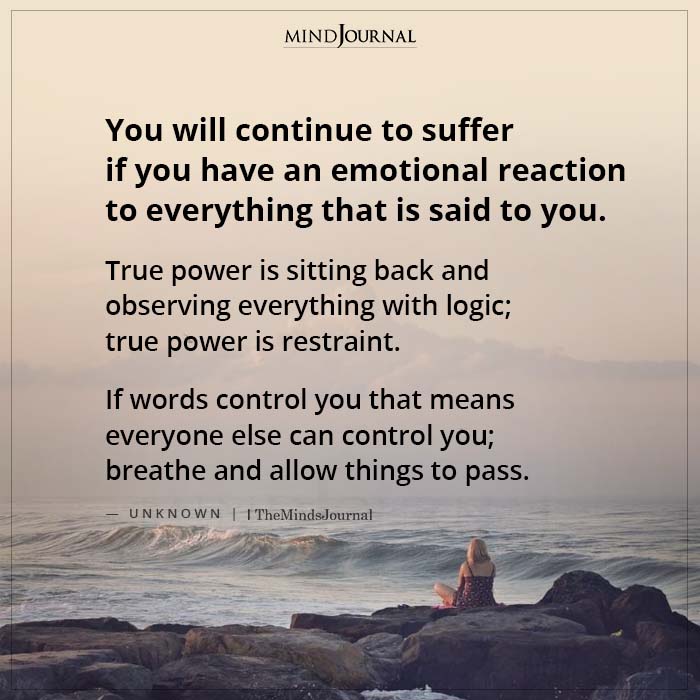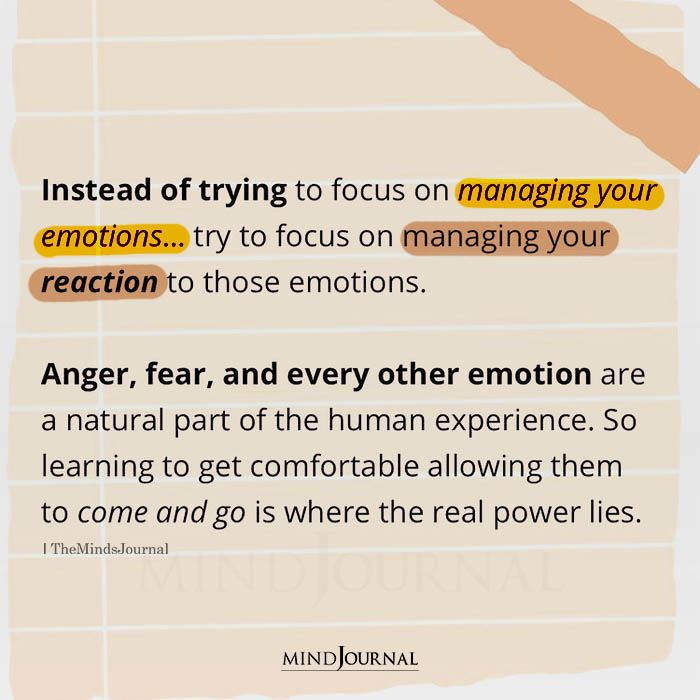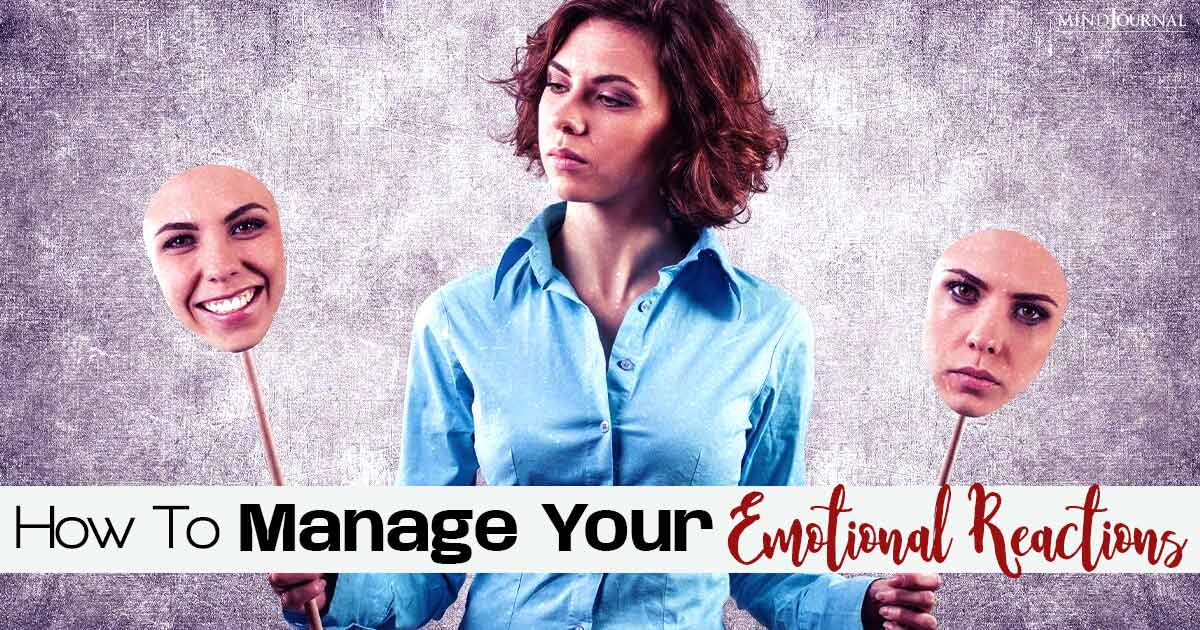If you are someone who struggles to control or manage your emotional reactions, then you have come to the right place. This article is going to talk about some of the best things you can do when it comes to controlling emotional reactions or emotional reactivity.
KEY POINTS
- Emotional reactions are based on mental habits you can change if you want to, believe you can, and can commit to the steps.
- Even when you know a new mental habit will relieve your stress, you must consistently override your protective brain while forming the new habit.
- Start with small steps so you can see your progress and celebrate your successes.
Emotions are reactions to the signals blaring in our bodies, not the events happening outside of our minds.
When I teach this, my statements are either challenged, or I see the resistance in people’s faces. Instead of feeling relieved, knowing they can control their reactions, they don’t want to believe me.
They would rather think that other people and world events are the cause of their reactions. They don’t want to believe that they can stay calm and logical when they feel hurt, frustrated, or afraid.
They long for peace of mind while wanting to believe that other people’s behaviors disturb their peace. Taking responsibility for their emotional reactions feels like hard work.
Do you want to stay stuck in the cycle of reacting, or are you willing to do the hard but rewarding work of mastering your reactions?
Related: How To Use Your Emotional Triggers For Personal Growth
What makes regulating emotional reactions difficult?
Humans are masters at rationalizing the easier path of staying stuck. We define anxiety as “good stress” and anger as the result of actions by “stupid, ill-informed people.” This pattern of thinking was created to protect our self-concept. The brain’s habit of blaming keeps us from feeling wrong, unsure, or vulnerable.
The brain’s desire to keep us safe is not always helpful; it causes us to react to every threat, not differentiating between flimsy and real danger. We feel out of control when blaming should make us feel in control. This reactivity makes it difficult to focus, disrupts creativity, and can lead to depression or to outbursts spewing contempt.
Noam Shpancer, Ph.D., said, “…Emotions, like thoughts, are mind events, not world events.”1
Emotions aren’t sparked by what you experience in the moment. They are set off by how your brain interprets events based on your past experiences.
You don’t react to what is. You react to what you think has occurred based on what you experienced or learned in the past.
The reasons you might give for reacting make you feel some certainty about who you are and how the world should work, even when the reasons aren’t relevant to the present moment. These interpretations fortify your beliefs and mental habits of reacting.
Albert Einstein said, “Reality is an illusion, albeit a very persistent one.”
Emotional reactivity is learned behavior, meaning you can learn new ways of thinking and reacting if you choose to. You can put your imagination to good use.

Breaking the cycle of your emotional reactions
Every time you repeat how you react to people, situations, and events, you ingrain a pattern that becomes a mental habit. The older the habit, the more rigid it is, and the longer your disciplined practice must be to change it.
Step one is to change your belief. Can you genuinely feel you can decrease the intensity and duration of your reactions? Changing your belief comes first, or your brain will sabotage your commitment when you aren’t perfect in your practice. Remember, practice gradually increases competence. Practice rarely, if ever, leads to perfection.
Step two is to know why you want to manage your emotions. It is not enough to say, “I want to be a better person.” You must know what outcome is important to you that will drive your motivation even when you have setbacks.
Know why you want to change, and then use your imagination to envision what is possible. Will you improve relationships that are important to you? What could this improvement look like?
Will you be more focused while working? What will this focus help you achieve? Will you sleep, eat, and feel more at ease in your body? How will your days look when your stress has subsided and you feel more in charge of your choices?
Related: What Is Emotional Dysregulation And Strategies For Finding Stability In Daily Life
Creating new habits of emotional reactions
Step three starts with defining two situations to which you would like to react with more calm, courage, or compassion. Don’t start with the toughest situations. Choose two you know you can master with practice to demonstrate to your brain that you can succeed at creating new habits.
Then break your goal into small action steps you can celebrate. Your brain needs evidence that you can be successful at your goals to support your steady growth instead of shielding you from failure by providing you a reason to give up.
When you notice what you are doing well, even if it is a small step, the reward motivates repetition. The more you practice, the better you get until the new behavior becomes automatic. A new habit is formed.
Each step should be one small behavior that will move you forward to achieving your goal. For example, if you are trying to improve your family relationships by being a better listener, you might start with the practice of releasing a full breath before you respond to a question. Notice when you do this until the pause becomes a habit.
Follow-up steps might include: 1) noticing and shifting to feeling curious after your breath, 2) letting go of thinking about something else to be present with the people you talk to, and 3) seeking to understand more clearly what others need before you give advice.
Remind yourself every morning to practice your step until you see consistent progress. Remind yourself every evening you can succeed so that your brain will support you even when you are doubtful.

Write about your victories in a journal. Talk about them with others who support your growth.
Don’t be impatient. You are chipping away at well-established routines.
Do you want to be a victim to your emotional responses or the master of your reactions? You can be the master if you commit to creating a new mental habit over time. You will believe it when you see it.
References:
1 Noam Shpancer Ph.D. “The Three Laws of Emotional Mastery” Psychology Today, May 4, 2021, pages 52-59.
Written By Marcia Reynolds
Originally Appeared On Psychology Today










Leave a Reply